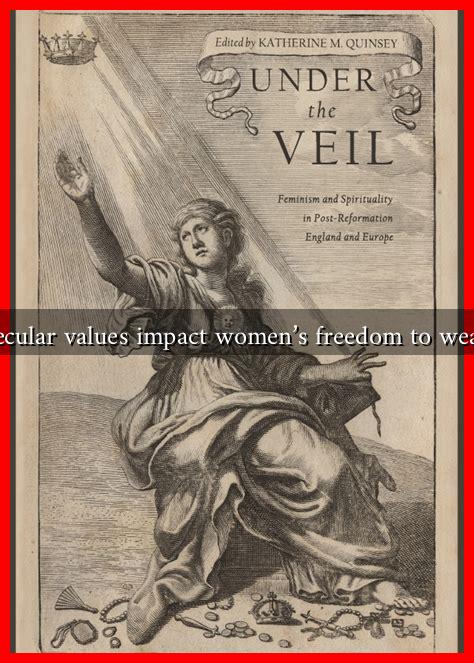-
Table of Contents
- How Do Secular Values Impact Women’s Freedom to Wear the Veil?
- The Veil: A Symbol of Identity and Belief
- Secularism and Its Implications
- Case Studies: France and Turkey
- France: The Burqa Ban
- Turkey: A Shift in Policy
- Statistics and Public Opinion
- Conclusion: Balancing Secularism and Personal Freedom
How Do Secular Values Impact Women’s Freedom to Wear the Veil?
The debate surrounding women’s freedom to wear the veil is a complex issue that intertwines cultural, religious, and secular values. In many societies, secularism promotes the idea of separating religion from public life, which can significantly influence how women express their identity through clothing, including the veil. This article explores the impact of secular values on women’s freedom to wear the veil, examining various perspectives and implications.
The Veil: A Symbol of Identity and Belief
The veil, often associated with Islamic culture, serves as a multifaceted symbol. For many women, it represents:
- Religious devotion and adherence to Islamic principles.
- A personal choice reflecting individual identity and autonomy.
- A cultural heritage that connects them to their roots.
However, the interpretation of the veil varies widely across different societies. In secular contexts, the veil can become a contentious issue, often viewed through the lens of women’s rights and liberation.
Secularism and Its Implications
Secularism advocates for a neutral public sphere where religion does not dictate laws or social norms. This principle can have both positive and negative implications for women who choose to wear the veil:
- Positive Implications: Secularism can protect individual rights, allowing women the freedom to choose whether or not to wear the veil without facing discrimination or coercion.
- Negative Implications: In some secular societies, the veil is perceived as a symbol of oppression, leading to policies that restrict its use in public spaces, such as schools and government buildings.
Case Studies: France and Turkey
Two prominent examples of secularism impacting the veil are France and Turkey, both of which have implemented laws regarding its use.
France: The Burqa Ban
In 2010, France enacted a law prohibiting the wearing of full-face veils in public spaces. The government justified this ban by arguing that it promotes secularism and gender equality. However, critics argue that this law infringes on personal freedoms and disproportionately affects Muslim women. A study by the Pew Research Center found that:
- Approximately 62% of French Muslims believe that wearing the veil is a personal choice.
- Many women who wear the veil report feeling marginalized and discriminated against due to the ban.
Turkey: A Shift in Policy
Turkey has experienced a fluctuating relationship with secularism and the veil. Historically, the Turkish government enforced strict secular policies, including a ban on headscarves in public institutions. However, in recent years, there has been a shift towards more lenient policies, allowing women to wear headscarves in schools and government offices. This change reflects a growing recognition of personal choice and religious expression.
Statistics and Public Opinion
Public opinion on the veil varies significantly across different secular societies. According to a 2021 survey by the European Union Agency for Fundamental Rights:
- Over 50% of respondents in several EU countries believe that women should have the right to wear the veil if they choose.
- Conversely, a significant portion of the population expresses concerns about the veil being a symbol of oppression.
This dichotomy highlights the ongoing struggle between secular values and individual freedoms, particularly for women who wear the veil.
Conclusion: Balancing Secularism and Personal Freedom
The impact of secular values on women’s freedom to wear the veil is a nuanced issue that requires careful consideration. While secularism can protect individual rights and promote gender equality, it can also lead to restrictions that undermine personal choice. As societies continue to grapple with these complexities, it is essential to foster dialogue that respects both secular principles and the rights of women to express their identities freely.
Ultimately, the challenge lies in finding a balance that honors individual freedoms while promoting a cohesive and inclusive society. Understanding the diverse perspectives surrounding the veil can pave the way for more informed discussions and policies that respect women’s autonomy.
For further reading on this topic, you can explore resources from the Pew Research Center and the European Union Agency for Fundamental Rights.

